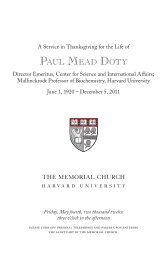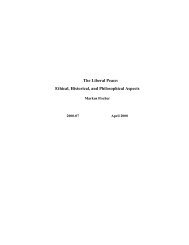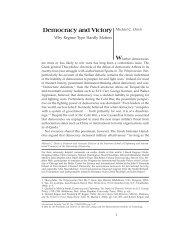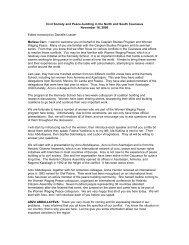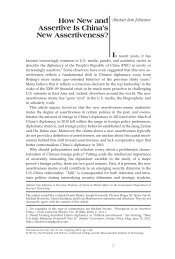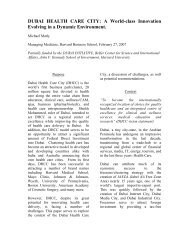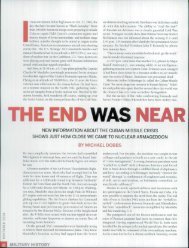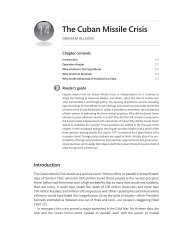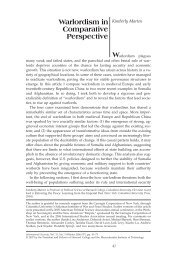The Next Step for U.S. Nuclear Policy - Project MUSE
The Next Step for U.S. Nuclear Policy - Project MUSE
The Next Step for U.S. Nuclear Policy - Project MUSE
You also want an ePaper? Increase the reach of your titles
YUMPU automatically turns print PDFs into web optimized ePapers that Google loves.
International Security 35:2 46<br />
international, political ramiªcations. Domestically, a president’s purposeful violation<br />
of an NFU pledge could incentivize the political opposition to rally<br />
strongly against the violation, providing an opportunity <strong>for</strong> vocal political opponents<br />
to generate attention and potentially bring independent voters and<br />
moderate members of the opposite political party into their camp. Internationally,<br />
breaking an NFU commitment risks damaging the United States’ reputation<br />
<strong>for</strong> honoring its commitments. 122 If the United States were unwilling to<br />
adhere to its public policies regarding something as important as nuclear<br />
weapons, states might calculate that they could not trust the United States at<br />
its word. Such beliefs could weaken conªdence in U.S. commitments to other<br />
unilateral, bilateral, and multilateral declarations and agreements; give states<br />
pause in considerations about entering into new agreements with the United<br />
States; and create strong doubts about the sincerity of future U.S. declaratory<br />
policies. In addition, the breach of NFU could undermine U.S. long-term security.<br />
<strong>Nuclear</strong> ªrst use would signal that the United States believes that nuclear<br />
weapons have military utility and is willing to employ them regardless of the<br />
political costs, thereby potentially encouraging further proliferation in an attempt<br />
to deter future U.S. nuclear attacks.<br />
To be sure, in the midst of an intense crisis U.S. decisionmakers, especially<br />
the president, would need to repeat and rein<strong>for</strong>ce the commitment to NFU,<br />
lest an opponent fear that the United States could suddenly change its nuclear<br />
policy. During a severe crisis or a limited conventional conºict with a nucleararmed<br />
adversary, U.S. leaders would need to make frequent public statements<br />
that U.S. nuclear weapons are solely <strong>for</strong> deterrence of nuclear attacks, and nuclear<br />
retaliation would be swift and severe if the opponent chooses to use<br />
nuclear weapons. Even more important, in a crisis the United States would<br />
have to carefully coordinate its declaratory policy and actions, especially with<br />
regard to alerting nuclear <strong>for</strong>ces. If in a crisis an opponent perceives the alert<br />
status of U.S. nuclear (and conventional) <strong>for</strong>ces as too high, the leadership<br />
might be inclined to believe that NFU is a bluff and the United States is preparing<br />
<strong>for</strong> a possible ªrst strike. Consequently, to enhance the credibility of NFU<br />
in a crisis, U.S. decisionmakers would need to pay careful attention to the alert<br />
status of both U.S. nuclear <strong>for</strong>ces and those of the opponent and ensure that, at<br />
a maximum, the alert status of U.S. <strong>for</strong>ces were raised on a tit-<strong>for</strong>-tat basis with<br />
the opponent. In such cases, the president could announce a decision to raise<br />
122. <strong>The</strong>re is a vast literature on the role that reputation plays in compliance with international<br />
laws and agreements. Recent works that examine the role of reputation in deterrence and nuclear<br />
issues include T.V. Paul, <strong>The</strong> Tradition of Non-Use of <strong>Nuclear</strong> Weapons (Stan<strong>for</strong>d, Calif.: Stan<strong>for</strong>d University<br />
Press, 2009), pp. 25–36; and Anne E. Sartori, Deterrence by Diplomacy (Princeton, N.J.:<br />
Princeton University Press, 2005).



